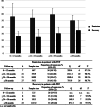Proportion and predictors of remission and recovery in first-episode psychosis: Systematic review and meta-analysis
- PMID: 34730080
- PMCID: PMC8668449
- DOI: 10.1192/j.eurpsy.2021.2246
Proportion and predictors of remission and recovery in first-episode psychosis: Systematic review and meta-analysis
Abstract
Background: To determine the proportion of patients in symptomatic remission and recovery following a first-episode of psychosis (FEP).
Methods: A multistep literature search using the Web of Science database, Cochrane Central Register of Reviews, Ovid/PsychINFO, and trial registries from database inception to November 5, 2020, was performed. Cohort studies and randomized control trials (RCT) investigating the proportion of remission and recovery following a FEP were included. Two independent researchers searched, following PRISMA and MOOSE guidelines and using a PROSPERO protocol. We performed meta-analyses regarding the proportion of remission/recovery (symptomatic plus functional outcomes). Heterogeneity was measured employing Q statistics and I2 test. To identify potential predictors, meta-regression analyses were conducted, as well as qualitative reporting of studies included in a systematic review. Sensitivity analyses were performed regarding different times of follow-up and type of studies.
Results: One hundred articles (82 cohorts and 18 RCTs) were included in the meta-analysis. The pooled proportion of symptomatic remission was 54% (95%CI [30, 49-58]) over a mean follow-up period of 43.57 months (SD = 51.82) in 76 studies. After excluding RCT from the sample, the proportion of remission remained similar (55%). The pooled proportion of recovery was 32% (95%CI [27-36]) over a mean follow-up period of 71.85 months (SD = 73.54) in 40 studies. After excluding RCT from the sample, the recovery proportion remained the same. No significant effect of any sociodemographic or clinical predictor was found.
Conclusions: Half of the patients are in symptomatic remission around 4 years after the FEP, while about a third show recovery after 5.5 years.
Keywords: First-episode psychosis; predictors; psychosis; recovery; remission.
Figures
References
-
- Lieberman JA. Is schizophrenia a neurodegenerative disorder? A clinical and neurobiological perspective. Biol Psychiatry. 1999;46:729–39. - PubMed
Publication types
MeSH terms
LinkOut - more resources
Full Text Sources
Medical



